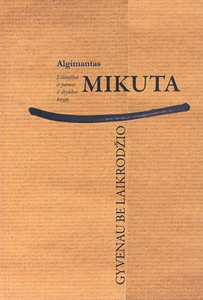Life without a clock, an autobiography without dates 6
In brief: Algimantas Mikuta is a poet who allowed himself the luxury to live without a clock. He measured and gave meaning to time not with routine working hours that turned many into slaves but with poems. In the book of selected works "I Lived without a Clock", published in 2014, poet tells the story of his life not with dates but with events, images and emotions.
The collection is quite different from the works of contemporary artists. It contains a lot of folklore (even if somewhat modernized): fables, songs, myths and legends, which in the poems are invoked as symbols and sometimes like the whole plot. A. Mikuta poems are rhythmic, full of repetition, thus it is not strange that some of them had turned into songs. Author writes very simply, pedantically following the rhyme.
Topicalities mentioned in the collection can cause nostalgia to the older generation. This is confirmed by V. Daujotytės memories in her review "Mikuta is more than Mikuta", "It was like I had returned back to the beginning of my own thinking about literature, to the poetry of my generation, to its paths." The readers of the younger generation can easily remain confused, surprised and maybe even bored. Water vans, cradles, timekeeper, slurping of the soup and restaurant culture, rushing into space and torchlight burning at home - these are all the signs of time that live in the memories of the older generation. To them poems speak with scents and flavors, with youth and maybe even childhood. For the younger generation these words are empty and tasteless - we do not have a code, which would help us decipher the poems, because we have never experienced "washing in the river on the timber rafting." Author takes us to the waters of nostalgia, where the younger generation never swam. Back then our clocks have not yet been ticking.
In the chapter "Spectrum" (1965) a certain frustration can be felt, the maximalism of the author has faded away, but you can still call him an idealist. A. Mikuta concentrates on brotherhood, a certain collective consciousness can be felt; work and creation is praised: Let us be unseen and invisible. / It is good not to disappoint. It is better to surprise. / Let us be diligent atoms of the planet / Atoms, which will neither burn, nor demolish ("Mirrors", p. 19).
Beginning with the chapter "The Land of Birds" (1968) bird symbolism in poems starts to increase; it plays an important role in the author's work. Bird symbol, has long been attributed to bards, wanderers and poets, who, like birds, spread their songs and ideas: I live in the attic. As every bird / I sing in the morning from my heights ("Surrounded by people and restaurants...” p. 35). A. Mikuta, like birds, travels, but does not go too far from his home; he changes, matures, but keeps his samogitian dialect and traditions alive.
In "Today we will draw lighting" (1973) war symbolism appears, together with fire, smoke and gas masks; poet starts talking about the urban and rural divide. This theme, later on, is developed in the following chapters.
While maturing more and more A. Mikuta gets closer to nature, realizes the importance of the natural cycle. Chapter "Owl's House" (1984) contains children, game motifs. Author emphasizes that we are a part of nature, its children and definitely not its rulers, although sometimes we like to imagine ourselves like that. He aptly notes that people tend to idealize themselves, but this perception is at odds with reality.

